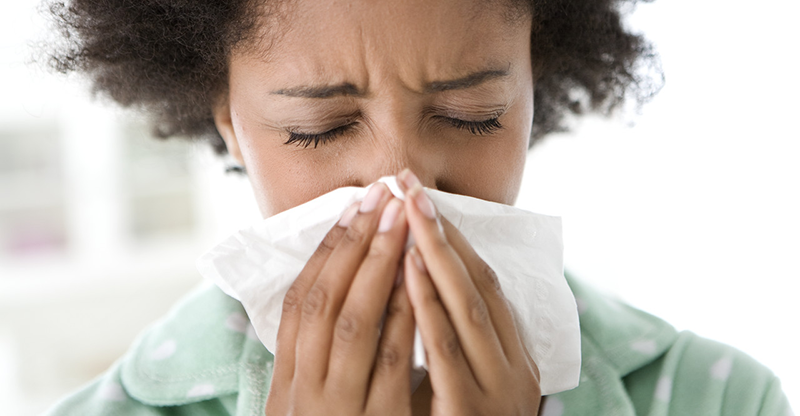Sinus Infection Symptoms or Allergies?

Do you have fall allergies, or are they sinus infection symptoms? How do you know? Learn more about the difference between allergies and a sinus infection.
Your nose is stuffed, you’re sneezing thick mucus, and your sinuses are on fire. Are you having an attack of fall allergies, or do you have sinus infection symptoms? The symptoms are so similar that many people have trouble telling the difference.
According to one survey, more than half of Americans have mistakenly diagnosed themselves with allergies, when the real cause of their misery was sinusitis. By treating the wrong condition, they delayed relief and potentially made themselves feel worse.
Here’s how to tell the difference between allergies and sinus infection symptoms and what to do if your real issue is chronic sinusitis.
YOU MIGHT ALSO LIKE: Are Sinus Infections Contagious?
Sinus infection symptoms and allergies
You get sinusitis when mucus backs up in your sinuses — the spaces behind your cheekbones, eyes, and nose. Bacteria that live inside your respiratory tract can get trapped in the clogged mucus, multiply, and cause an infection. Most often, a cold triggers the mucus backup, but allergies can also set off sinusitis.
Sinusitis can be short-term (acute) or lingering (chronic). With acute sinusitis, symptoms usually go away within four weeks. Chronic sinusitis can stick around for three months or more.
Although sinusitis can cause facial pain and thick yellow or green mucus, a clogged, dripping nose is a hallmark of fall allergies, too. If you’re used to having allergy attacks at this time of year, you might assume that’s what you’re dealing with. Because of the similarities between the two conditions, nearly 50 percent of people surveyed said they self-diagnose and self-treat their symptoms.
But if your symptoms linger for longer than 12 weeks, or they come back more than three times a year, you should suspect chronic sinusitis and see a specialist.
"Since many patients are confused about which medications to take and more than 50 percent of patients do not respond adequately to medications, it’s import that they consult with an ear, nose and throat (ENT) physician to get the most appropriate treatment to alleviate long-term suffering,” said Stacey Silvers, MD, of Mount Sinai Beth Israel Hospital in New York City.
In addition to a physical exam, the doctor may do a CT scan to view the inside of your sinuses. You might also have a test called endoscopy, in which the doctor threads a thin, flexible tube up your nasal cavity to see how well your sinuses are draining into your nose.
Getting relief from sinus infection symptoms
For short-term sinusitis, home remedies like rinsing with saline (salt and water), breathing in hot steam, or drinking extra fluids can help flush mucus out of your sinuses. To improve chronic sinusitis symptoms and open your clogged breathing passageways, try an over-the-counter steroid nasal spray, decongestant, or a medicine that thins mucus.
If allergies cause your sinusitis, see an allergy specialist for tests to pinpoint your triggers, which may be ragweed, dust mites, pet dander, or mold. You can then take steps to avoid those triggers or get allergy shots to prevent symptoms and stop sinusitis from coming back.
If all other treatments fail, you may need surgery. A procedure called balloon sinuplasty inserts a balloon-topped catheter into your swollen sinuses. The balloon is inflated to widen the sinuses and is then removed.
Surgery can also fix structural problems that might have led to the sinusitis. For example, your surgeon may do a procedure to widen your drainage passageways or fix a deviated septum (the bone and cartilage that divide your left and right nostrils).
Regardless of which symptoms are bugging you this season, don’t try to self-diagnose. See a doctor to find the real cause of your symptoms, and get the treatment best targeted to your condition.
Updated:
September 01, 2023
Reviewed By:
Janet O’Dell, RN